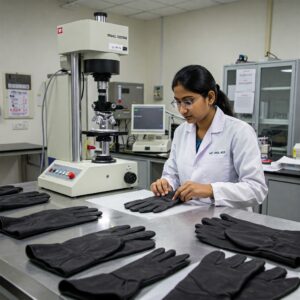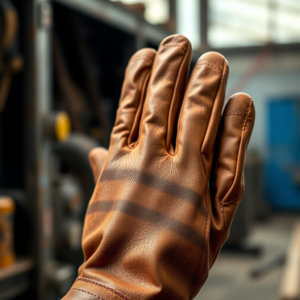
India has become a major international centre for the production and export of leather gloves. Upholding strict quality standards is essential to preserving this standing and guaranteeing the security and contentment of end customers everywhere. From the selection of raw materials to the finished product, these standards cover a wide range of manufacturing-related topics.
Key Aspects of Quality Standards:
- Leather Quality: The foundation of a good leather glove lies in the quality of the leather used. Standards often specify the type of leather (e.g., cowhide, goatskin, buffalo), its grade (e.g., full-grain, top-grain, split), thickness, and permissible defects. Factors like tensile strength, tear resistance, and abrasion resistance of the leather are also crucial. Leather glove manufacturers often utilize locally sourced leather, ensuring a consistent supply, but quality checks are vital to meet international expectations.
- Manufacturing Process: All aspects of production, including cutting, stitching, lining, and finishing, are covered by standards. Durability depends on the choice of suitable threads, seam strength, and stitching quality. If linings are utilized, they must be firmly fastened and composed of materials that are appropriate for insulation and comfort. The gloves are guaranteed to be free of sharp edges and other flaws via finishing procedures.
- Performance Requirements: Depending on the intended use of the gloves, specific performance standards apply. These can include:
- Mechanical Risks (EN 388): This European standard, widely recognized internationally, assesses gloves’ resistance to abrasion, cut, tear, and puncture. Ratings are provided for each category, indicating the level of protection offered.
- Thermal Risks (EN 407): For gloves designed for heat resistance, this standard evaluates performance against contact heat, convective heat, radiant heat, small splashes of molten metal, and large splashes of molten metal.
- Chemical Risks (EN 374): Gloves intended for chemical handling must meet standards for resistance to penetration, permeation, and degradation by specific chemicals.
- Welding Gloves (EN 12477): Specific standards exist for welding gloves, addressing protection against heat, flame, mechanical risks, and often electrical insulation.
- Indian Standards (IS): The Bureau of Indian Standards (BIS) also has its own set of standards for leather gloves, such as IS 2573 for leather gauntlets and mittens for industrial workers and welders, and IS 6994 (Part 1) for leather and cotton safety gloves. These standards specify material requirements, construction, and performance criteria. More recent standards like IS 11230: 2023 for leather for utility gloves also exist.
- Testing and Certification: Indian leather glove producers frequently put their goods through a thorough testing process in accredited labs to make sure they meet all applicable national and international requirements. Buyers are reassured about the gloves’ performance and quality by certifications from reputable organizations.
Why These Standards Matter for India as an Export Hub:
Adherence to stringent quality standards is crucial for Indian leather glove manufacturers and exporters to:
- Gain International Recognition: Meeting or exceeding global standards like EN norms enhances the credibility and acceptance of Indian-made gloves in international markets.
- Build Trust with Buyers: Consistent quality builds long-term relationships and fosters trust with international clients.
- Ensure Worker Safety Globally: Supplying gloves that meet safety standards contributes to the well-being of workers in various industries worldwide.
- Remain Competitive: In a globalized marketplace, quality is a key differentiation. Adhering to high standards allows Indian manufacturers to compete effectively with manufacturers from other countries.
In conclusion, the flourishing leather glove manufacturing sector in India depends on quality standards, which are more than merely a benchmark. Indian manufacturers may establish themselves as a major and trustworthy supplier of leather work gloves for the global market by putting quality first at every stage of manufacturing and abiding by pertinent national and international standards.









